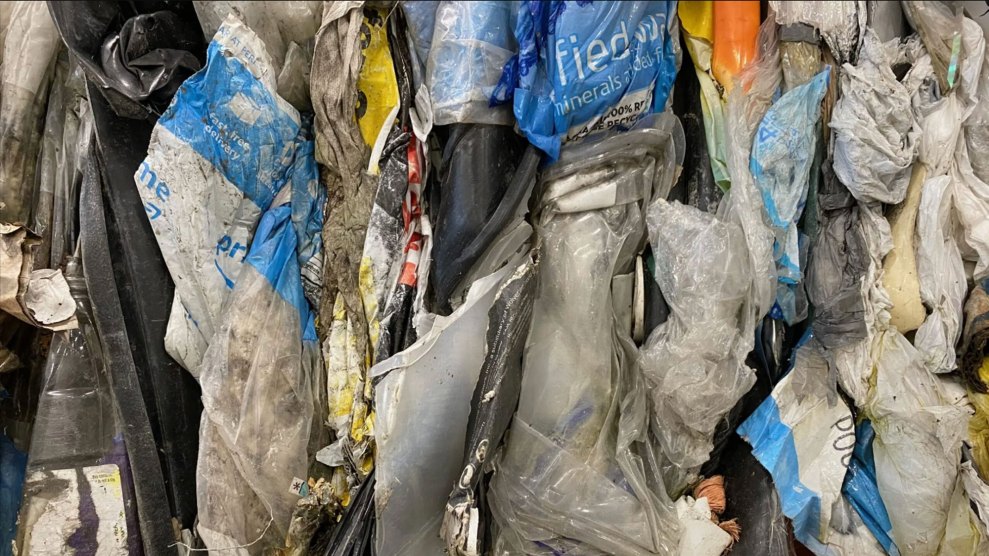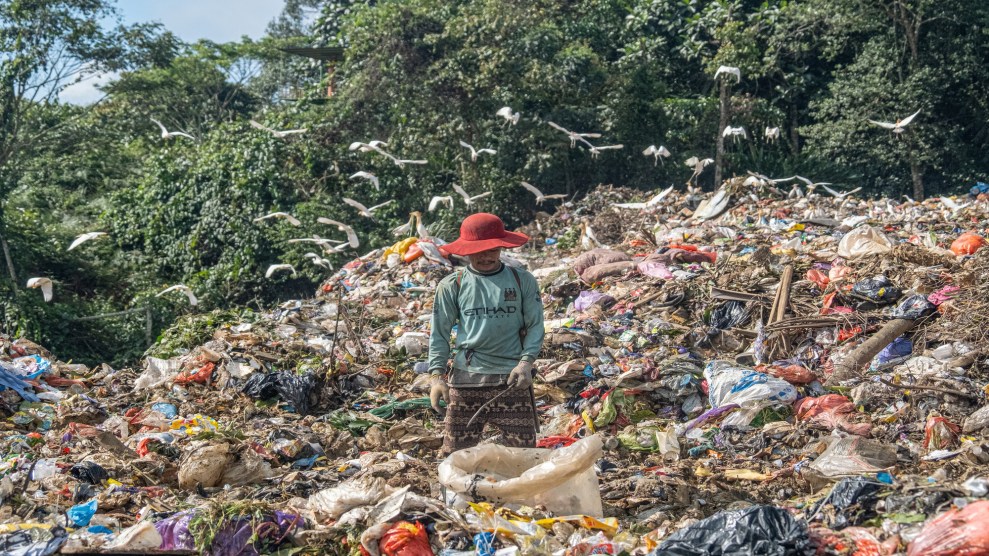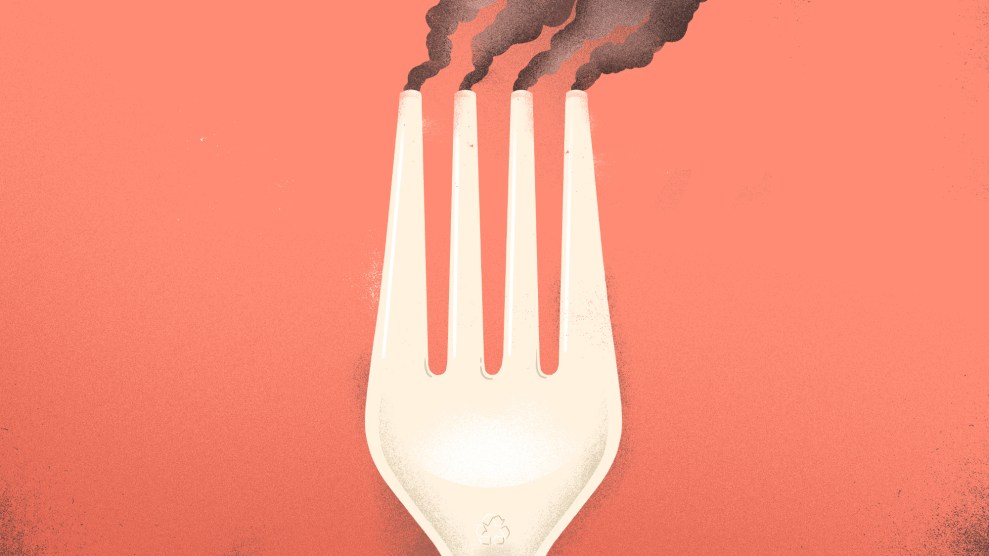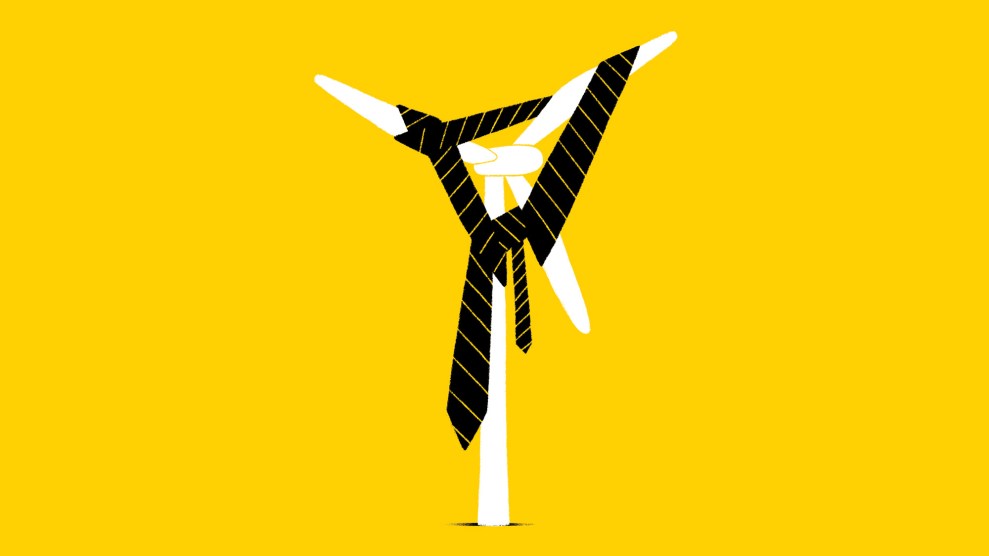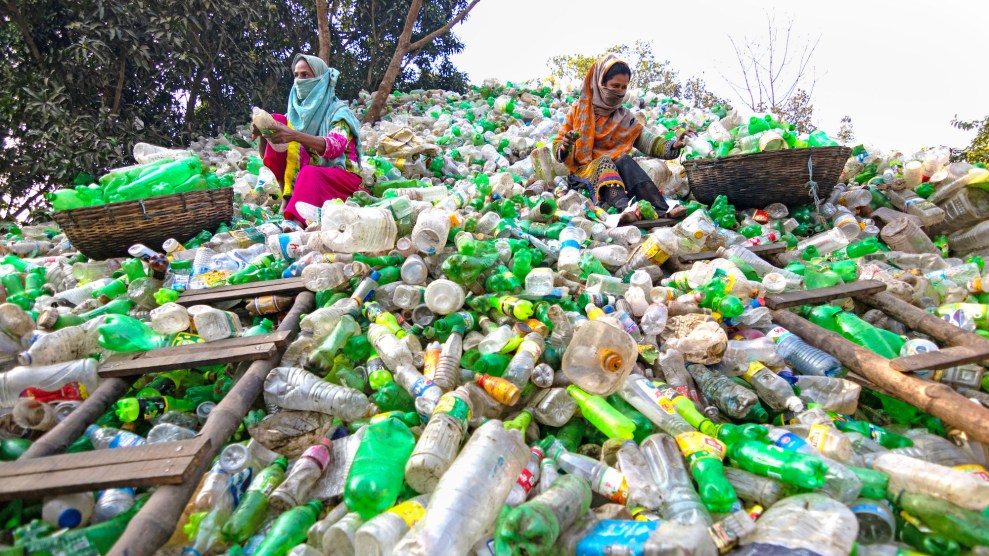
Workers sort used plastic bottles at a recycling factory in Dhaka, BangladeshJoy Saha/Zuma
This story was originally published by Inside Climate News and is reproduced here as part of the Climate Desk collaboration.
Fossil fuel and chemical company interests are out in force at the United Nations meeting in Nairobi, where delegates from about 170 countries are negotiating the potential terms of a global treaty to reduce plastic pollution.
The Center for International Environmental Law, after combing over the official list of participants, has identified what it describes as 143 fossil fuel and chemical industry lobbyists registered to attend the meeting, presumably to influence the outcome.
They come from some of the biggest names in the fossil fuel and chemical industries, including US-based ExxonMobil and Dow Chemical, participating through trade or lobby organizations such as the American Fuel and Petrochemical Manufacturers or the Chemical and Allied Industries Association.
Other industry groups, such as the American Chemistry Council and Plastics Industry Association, are represented, along with their counterparts who represent similar interests in other countries. Some countries, like China and Iran, have petrochemical industry representatives in their official state delegations, according to the CIEL analysis.
Nearly all plastics are made from fossil fuels, so petrochemical companies that make them stand to be directly affected by the talks, which conclude on Sunday. For example, one of the thorniest issues that delegates must come to grips with is whether to cap or reduce plastic production, something environmental groups, scientists and dozens of nations are supporting.
The industry, however, vigorously opposes such limits. “They’re here,” Bethanie Carney Almroth, a scientist and treaty talks observer, said of the industry representatives. “They are pushing their agenda. They are protecting their business interests,” despite research showing that current and projected levels of plastic production are not sustainable, she said.
“The modeling is showing we need to reduce production,” said Almroth, an ecotoxicology professor at Sweden’s University of Gothenburg who is active with the Scientists’ Coalition for an Effective Plastics Treaty. The group of more than 300 scientists from 50 countries is seeking a formal role for independent scientists in the treaty talks, such as through official technical working groups. “The plastic being produced is already causing impacts to the level that it is destabilizing planetary function,” Almroth said.
A Dow representative defended the participation of its employees at the Nairobi meeting. “Dow supports the creation and adoption of a legally binding global instrument to end plastic pollution and help accelerate the transition to a circular economy for plastics,” said Rachelle Schikorra, director of corporate communications for the Midland, Michigan-based company. “As a global materials science company, we have expertise and insights that are valuable to the discussion as the global community seeks to improve waste management systems, eliminate plastic leakage into the environment, and enable more circular solutions.”
Global annual plastic production has climbed to more than 400 million metric tons in recent years, an amount that could triple by 2060, according to the Organization for Economic Co-operation and Development, a group that represents developed nations. Globally, less than 10 percent of plastic waste gets recycled.
Neither the American Chemistry Council, the Plastics Industry Association nor the American Fuel and Petrochemical Manufacturers responded to requests for comment on their participation in the treaty talks. But the American Chemistry Council issued a statement last December following the previous round of negotiations that it had specifically told governments not to impose limits on future plastic production by making a case that lightweight, durable plastic products were necessary for a sustainable economy.
“ACC strongly cautioned governments against production caps on plastics as proposed by some groups,” the lobby group said at the time. “In order to combat climate change and sustain a growing global population, such a misguided approach would hinder progress towards a more sustainable, lower carbon future. Sustainable development relies on plastics for wind turbines, solar panels, lightweight electric vehicles, building insulation, clean water and preventing food waste.”
While plastic, made of thousands of chemicals—many of them toxic—has become essential for modern life, it’s also become a menace. About 40 percent of plastic goes into consumer packaging, where it is used once and tossed aside. Millions of tons of plastic globally are discarded or littered as waste each year. The smallest of plastic particles are also now ubiquitous, even inside human bodies.
Last year, 175 nations agreed to find a way to stop plastic from choking ocean and land ecosystems and to clean up legacy plastic pollution, with a goal of reaching an agreement by the end of next year.
In the runup to the Nairobi meeting, environmental groups and scientists called on the United Nations Environment Program and Intergovernmental Negotiating Committee (INC) secretariat, which are holding the talks, to adopt strong conflict of interest policies to safeguard the negotiating process from industry influence.
A spokesperson of the INC Secretariat, which carries out the day-to-day work supporting the negotiations, did not directly respond to the criticisms. But the spokesperson said the current policy allows for participants from accredited UN entities, intergovernmental organizations and non-governmental organizations to participate as observers.
“This means that any participating industry representative must register through these organizations, or as part of Member States’ delegation. It is up to each Member State or accredited organization to select and nominate their delegation to INC sessions. The registration form…requires participants to disclose their affiliation.”
Similar conflict of interest complaints have dogged climate talks as part of the United Nations Framework Convention on Climate Change, with its next Conference of Parties meeting starting Nov. 30, hosted by oil-rich United Arab Emirates and led by Sultan Al Jaber, the chief executive of the Abu Dhabi National Oil Company.
An increasing number of civic groups, as well as elected officials in several countries, have said the growing influence of fossil fuel companies in the climate negotiations threatens the UNFCC’s fundamental credibility, as well as its ability to help rein in the emissions from burning oil, gas and coal. This year for the first time, the United Nations climate secretariat seemed open to change and took the step of requiring participants at the UAE meeting to disclose their affiliations.
But those affiliations aren’t always apparent during the plastics treaty talks, so tougher conflict of interest rules are needed, according to CIEL, which conducted its analysis with help from Bloomberg Philanthropies’ Beyond Petrochemicals and environmental groups Greenpeace, International Pollutants Elimination Network (IPEN) and Break Free From Plastic.
CIEL’s Giulia Carlini, who was a co-author of a commentary on the treaty talks and industry influence published Oct. 4 by the prestigious medical journal The Lancet, said the industry has a major incentive to mislead delegates because of its economic reliance on fossil fuels and growing concerns about the toxic nature of plastics, which are made with thousands of chemicals.
With plastic production forecast to soar without action, Carlina said, “a plastics treaty that reduces plastics production and bans hazardous chemicals in plastics is a clear threat to their business-as-usual model.”
The Lancet article made a case that the United Nations plastics treaty negotiators should take a lead from the World Health Organization, which has limited tobacco industry involvement in its Framework Convention on Tobacco Control, a 2003 global treaty that seeks to protect people from the health, social, environmental and economic effects of tobacco. It described the tobacco treaty as the only international treaty that explicitly addresses the potential for corporations to subvert its objectives.
In Nairobi, fossil fuel lobbyists are finding empathy within some countries’ delegations. Iran, Saudi Arabia, Russia, Cuba, China and Bahrain have formed a Global Coalition for Plastics Sustainability to advocate for a treaty that would focus on waste management instead of production cuts, Reuters reported.
And, the United States, the world’s largest oil and gas producer in 2022, has been careful about what it’s said about plastic production cuts. A State Department spokesperson told Inside Climate News that “an agreement that relies solely on production caps might diminish participation … as well as the ambition of the agreement itself, thereby risking progress toward our common goal of addressing plastic pollution.”
Disclosure of lobbyist affiliations is not enough, Carlina said. “UNEP should start recognizing and identifying corporate actors whose interests fundamentally conflict with the negotiations, such as the petrochemical and fossil fuel industries. There should be a screening of participants, and a disclosure of interests on affiliations and funding related to these conflicted industries.”
She said the conflict of interest rules should apply to all observers, including those in the non-governmental category, which includes environmental groups.
Participants should require disclosure, at minimum, if their salary or expenses associated with attending the INC derive in whole or in part from for-profit entities or state-owned enterprises with financial interests in any segment of the plastic supply chain, she said.
For her part, Almroth added, the UN should also “protect spaces around the negotiations from industry influence, and guarantee seats for Indigenous knowledge holders and independent scientists. Only then can we guarantee a process that lays the groundwork for the best policy outcome possible.”
